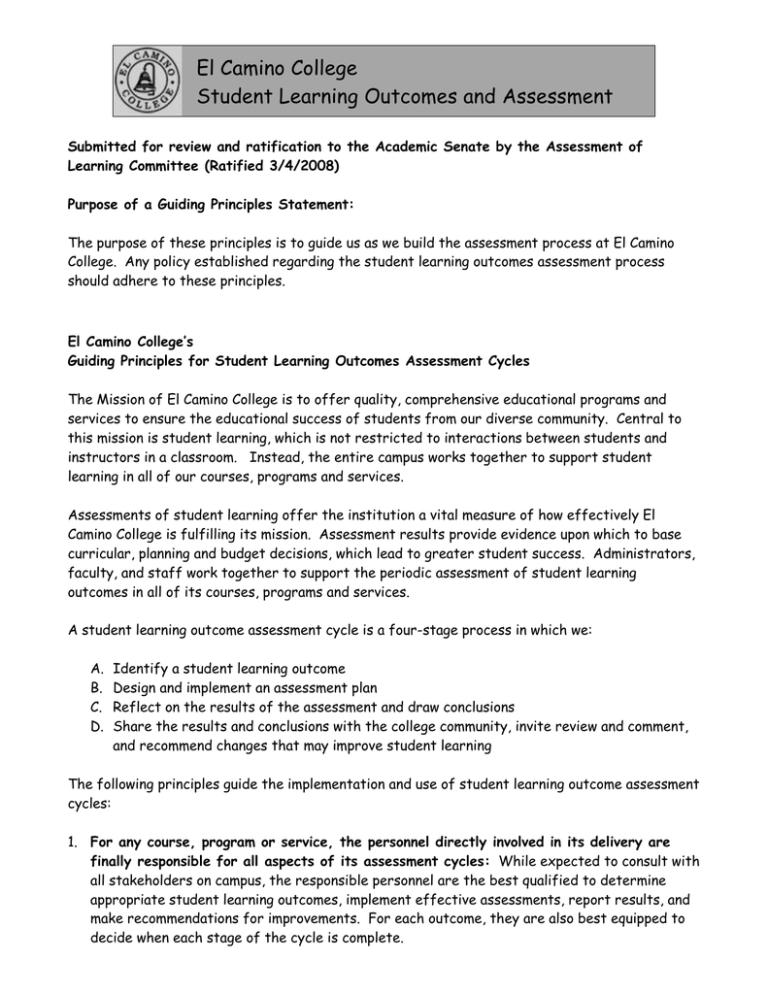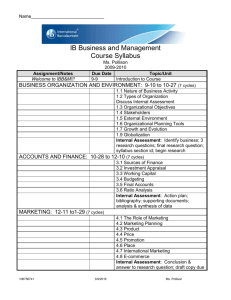El Camino College Student Learning Outcomes and Assessment
advertisement

El Camino College Student Learning Outcomes and Assessment Submitted for review and ratification to the Academic Senate by the Assessment of Learning Committee (Ratified 3/4/2008) Purpose of a Guiding Principles Statement: The purpose of these principles is to guide us as we build the assessment process at El Camino College. Any policy established regarding the student learning outcomes assessment process should adhere to these principles. El Camino College’s Guiding Principles for Student Learning Outcomes Assessment Cycles The Mission of El Camino College is to offer quality, comprehensive educational programs and services to ensure the educational success of students from our diverse community. Central to this mission is student learning, which is not restricted to interactions between students and instructors in a classroom. Instead, the entire campus works together to support student learning in all of our courses, programs and services. Assessments of student learning offer the institution a vital measure of how effectively El Camino College is fulfilling its mission. Assessment results provide evidence upon which to base curricular, planning and budget decisions, which lead to greater student success. Administrators, faculty, and staff work together to support the periodic assessment of student learning outcomes in all of its courses, programs and services. A student learning outcome assessment cycle is a four-stage process in which we: A. B. C. D. Identify a student learning outcome Design and implement an assessment plan Reflect on the results of the assessment and draw conclusions Share the results and conclusions with the college community, invite review and comment, and recommend changes that may improve student learning The following principles guide the implementation and use of student learning outcome assessment cycles: 1. For any course, program or service, the personnel directly involved in its delivery are finally responsible for all aspects of its assessment cycles: While expected to consult with all stakeholders on campus, the responsible personnel are the best qualified to determine appropriate student learning outcomes, implement effective assessments, report results, and make recommendations for improvements. For each outcome, they are also best equipped to decide when each stage of the cycle is complete. 2. Broad participation in assessment cycles by administrators, faculty and staff is a shared responsibility: The more personnel that participate in the production and analysis of assessment results, the greater the likelihood that proposed changes will be implemented and sustained. 3. Student learning outcomes are defined in various ways. Student learning outcomes vary tremendously among courses, programs and services; they may be cognitive, affective, or psychomotor. They change over time and are informed by a multitude of factors, including community needs, discipline standards, and previous assessment cycles. 4. Assessments use various methods and may build upon existing assessments: Assessment techniques range widely in style and rigor. Whenever feasible, existing assessment instruments are modified to meet new assessment needs. If possible, new assessment routines replace old ones. Direct measures of student learning are preferred, although indirect measures are used, particularly in sectors that indirectly support student learning. 5. Curricular, planning and budget decisions are informed by assessment results: Assessment results provide evidence that allow administrators, faculty and staff to make wise planning and budget decisions. All curricular and program reviews are stronger when they incorporate assessment results in their reports. An individual considers assessment results as part of the self-evaluation process. 6. Assessments are used to evaluate and improve student learning: Information gleaned from assessment cycles is used primarily to understand the factors affecting student learning and to improve instruction and services. Assessments of student learning outcomes are not used to undermine academic freedom. 7. Resources are provided for assessment cycles: For some assessment cycles, existing resources suffice; for others, additional resources are needed. Administrators, working together with faculty and staff, find the means of conducting meaningful assessment cycles without compromising the quality of instruction, delivery of services or overburdening specific personnel.
